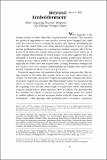| dc.contributor.author | Bell, Mark Stephen | |
| dc.date.accessioned | 2015-12-23T15:40:15Z | |
| dc.date.available | 2015-12-23T15:40:15Z | |
| dc.date.issued | 2015-07 | |
| dc.identifier.issn | 0162-2889 | |
| dc.identifier.issn | 1531-4804 | |
| dc.identifier.uri | http://hdl.handle.net/1721.1/100497 | |
| dc.description.abstract | What happens to the foreign policies of states when they acquire nuclear weapons? Despite its importance, this question has not been answered satisfactorily. Nuclear weapons can facilitate six conceptually distinct foreign policy behaviors: aggression, expansion, independence, bolstering, steadfastness, and compromise. This typology of foreign policy behaviors enables scholars to move beyond simple claims of “nuclear emboldenment,” and allows for more nuanced examination of the ways in which nuclear weapons affect the foreign policies of current and future nuclear states. The typology also sheds light on Great Britain's response to nuclear acquisition. Britain used nuclear weapons to engage in greater levels of steadfastness in responding to challenges, bolstering junior allies, and demonstrating independence from the United States, but it did not engage in greater levels of aggression, expansion, or compromise. The typology and the British case demonstrate the value of distinguishing among different effects of nuclear weapons acquisition, have implications for scholars' and policymakers' understanding of the role of nuclear weapons in international politics, and suggest avenues for future research. | en_US |
| dc.language.iso | en_US | |
| dc.publisher | MIT Press | en_US |
| dc.relation.isversionof | http://dx.doi.org/10.1162/ISEC_a_00204 | en_US |
| dc.rights | Article is made available in accordance with the publisher's policy and may be subject to US copyright law. Please refer to the publisher's site for terms of use. | en_US |
| dc.source | MIT Press | en_US |
| dc.title | Beyond Emboldenment: How Acquiring Nuclear Weapons Can Change Foreign Policy | en_US |
| dc.type | Article | en_US |
| dc.identifier.citation | Bell, Mark S. “Beyond Emboldenment: How Acquiring Nuclear Weapons Can Change Foreign Policy.” International Security 40, no. 1 (July 2015): 87–119. © 2015 by the President and Fellows of Harvard College and the Massachusetts Institute of Technology | en_US |
| dc.contributor.department | Massachusetts Institute of Technology. Department of Political Science | en_US |
| dc.contributor.mitauthor | Bell, Mark Stephen | en_US |
| dc.relation.journal | International Security | en_US |
| dc.eprint.version | Final published version | en_US |
| dc.type.uri | http://purl.org/eprint/type/JournalArticle | en_US |
| eprint.status | http://purl.org/eprint/status/PeerReviewed | en_US |
| dspace.orderedauthors | Bell, Mark S. | en_US |
| dc.identifier.orcid | https://orcid.org/0000-0002-5611-052X | |
| mit.license | PUBLISHER_POLICY | en_US |
| mit.metadata.status | Complete | |
